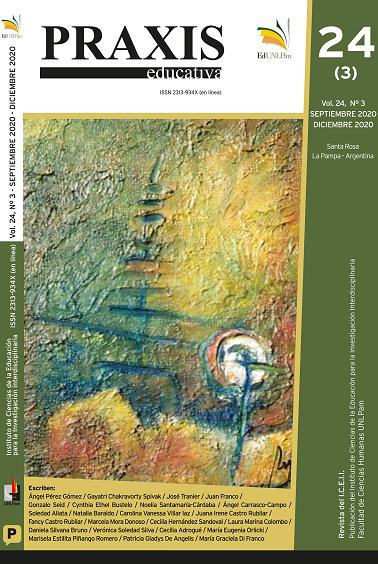Access and use of Information and Communication Technologies (ICT) in Secondary School in Different Socioeconomic Contexts in Argentina
DOI:
https://doi.org/10.19137/praxiseducativa-2020-240308Keywords:
access to technology, inequality, secondary education, ArgentinaAbstract
The educational sector has assumed long ago the challenge of incorporating technologies into teaching and learning processes. The objective of this work is to analyze the access and uses of ICT in the home of the students and in the school using the microdata of the 2016 Learning Census for seniors in high school and to show the inequalities observed by socioeconomic level of the student for type of school management and province. At the national level, The results show that although there are large disparities according to socioeconomic level in access to a computer in the home, there are no differences in access to a computer in school. In addition, there are no differences by socioeconomic level of the students in the activities proposed by the teachers to do with the computer during class time.
Downloads
References
Instituto Nacional de Estadísticas y Censos (INDEC) (2011). “Encuesta Nacional sobre Acceso y Uso de Tecnologías de la Información y la Comunicación (ENTIC). Resultados del tercer trimestre 2011”. Buenos Aires, INDEC. Recuperado de: https://www.indec.gob.ar/uploads/informesdeprensa/entic_06_13.pdf
Keegan Eamon, M. (2004). “Digital divide in computer access and use between poor and non-poor youth”. Journal of Sociology & Social Welfare, 31, 91.
Ley 26.206 (2006). Ley de Educación Nacional.
Tedesco, J. C, Steinberg, C., y Meschengieser, C. (2017). “¿Cómo se integran las TIC en el modelo 1 a 1 en las escuelas secundarias en Argentina?”, UNICEF. Recuperado de https://forjandounfuturo.files.wordpress.com/2018/01/edu-tic-educacionsecundaria.pdf
Tófalo, A. (2016). “Aprender 2016. Acceso y uso de TICS en estudiantes y docentes”. Serie de Informes Temáticas, Secretaria de Evaluación Educativa, Ministerio de Educación de la Nación. Recuperado de https://www.argentina.gob.ar/sites/default/files/acceso_y_uso_de_tic_en_estudiantes_y_docentes.pdf
Sunkel, G., y Trucco, D. (2010). “Nuevas tecnologías de la información y la comunicación para la educación en América Latina. Riesgos y oportunidades”. Serie Políticas Sociales, 167, 1-7. Recuperado de: https://repositorio.cepal.org/bitstream/handle/11362/6174/lcl3266.pdf?sequence=1&isAllowed=y
Vacchieri, A. (2013). “Las políticas TIC en los sistemas educativos de América Latina: Caso Argentina”. Buenos Aires: UNICEF.
Downloads
Published
Issue
Section
License
Copyright Notice
Editorial Committee Educational Praxis Magazine:
I hereby declare that I am the author of the article titled (article name), that it is original and my own and that it was not previously published in any other format or medium. I declare to know that the magazine will not charge me any type of fee under any circumstances, nor will I receive any type of monetary compensation If it were accepted for publication in Educational Praxis, I authorize the aforementioned magazine to publish it digitally and to advertise it on its social networks.
If the work is published, I adhere to the Creative Commons license called "Attribution - Non-Commercial Share Alike CC BY-NC-SA", through which it is allowed to copy, reproduce, distribute, publicly communicate the work and generate derivative works, as long as when the original author is cited and acknowledged. This license has been used since September 2018. In 2016 CC BY NC ND 4.0 was adhered to; and in the years 2017 and 2018 (January-August) CC BY NC 4.0.
This CC BY-NC-SA Share Alike license does not, however, permit commercial use of the work. As an author, the journal may establish additional agreements for the non-exclusive distribution of the version of the work published in the journal, it allows me to self-archive the published articles, in their post-print version, in institutional, thematic repositories, personal web pages or any other relevant use. with the recognition of having been first published in this journal.
Educational Praxis adheres to DORA (Declaration on Research Assessment) signed in San Francisco, California, on December 16, 2012, and to the Declaration of Mexico (Joint Declaration LATINDEX - REDALYC - CLACSO - IBICT).















_(1)2.png)


3.png)











_(2).png)






2.jpg)









